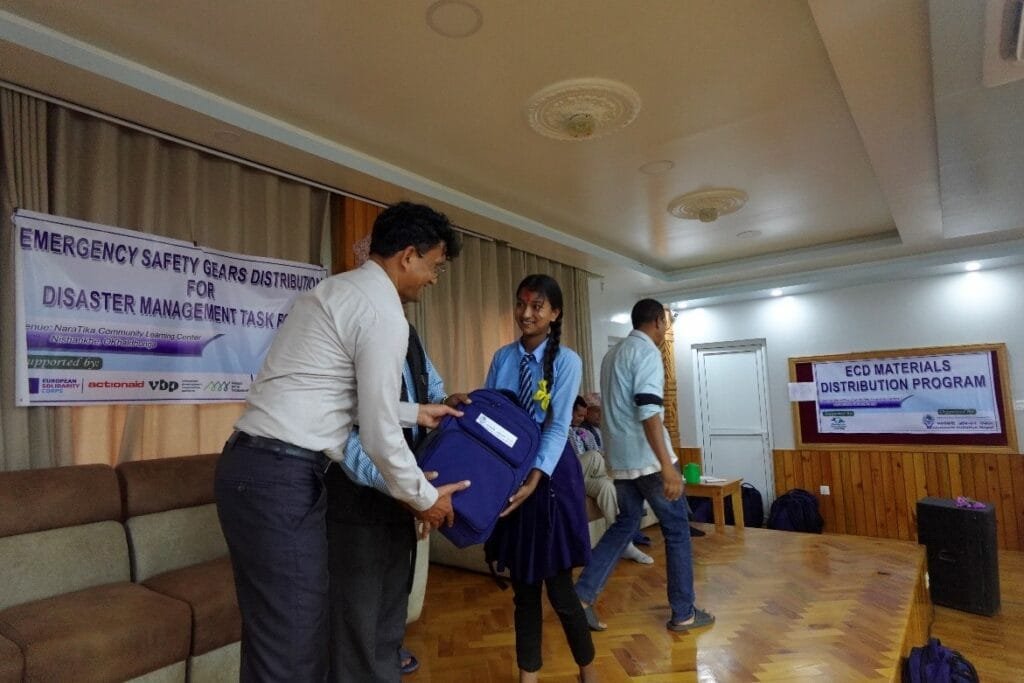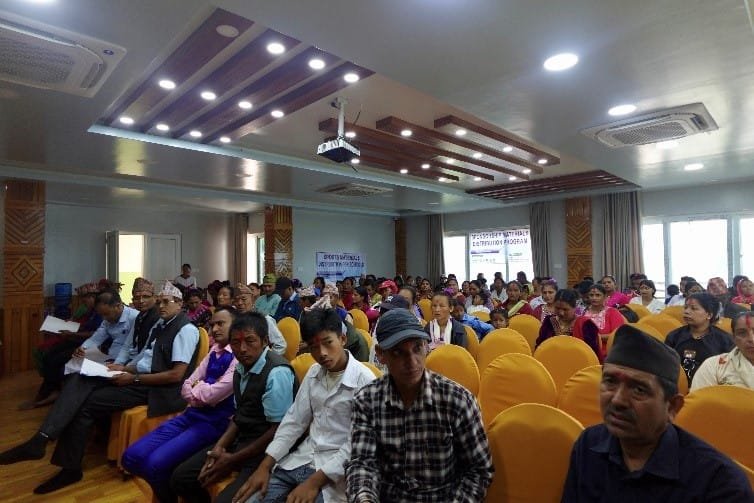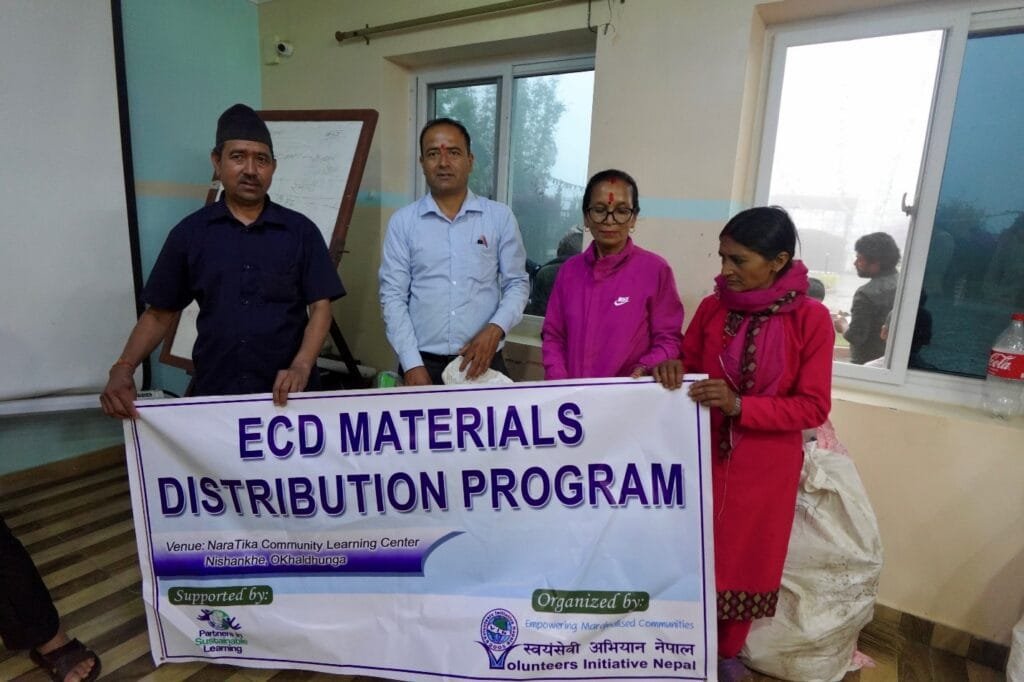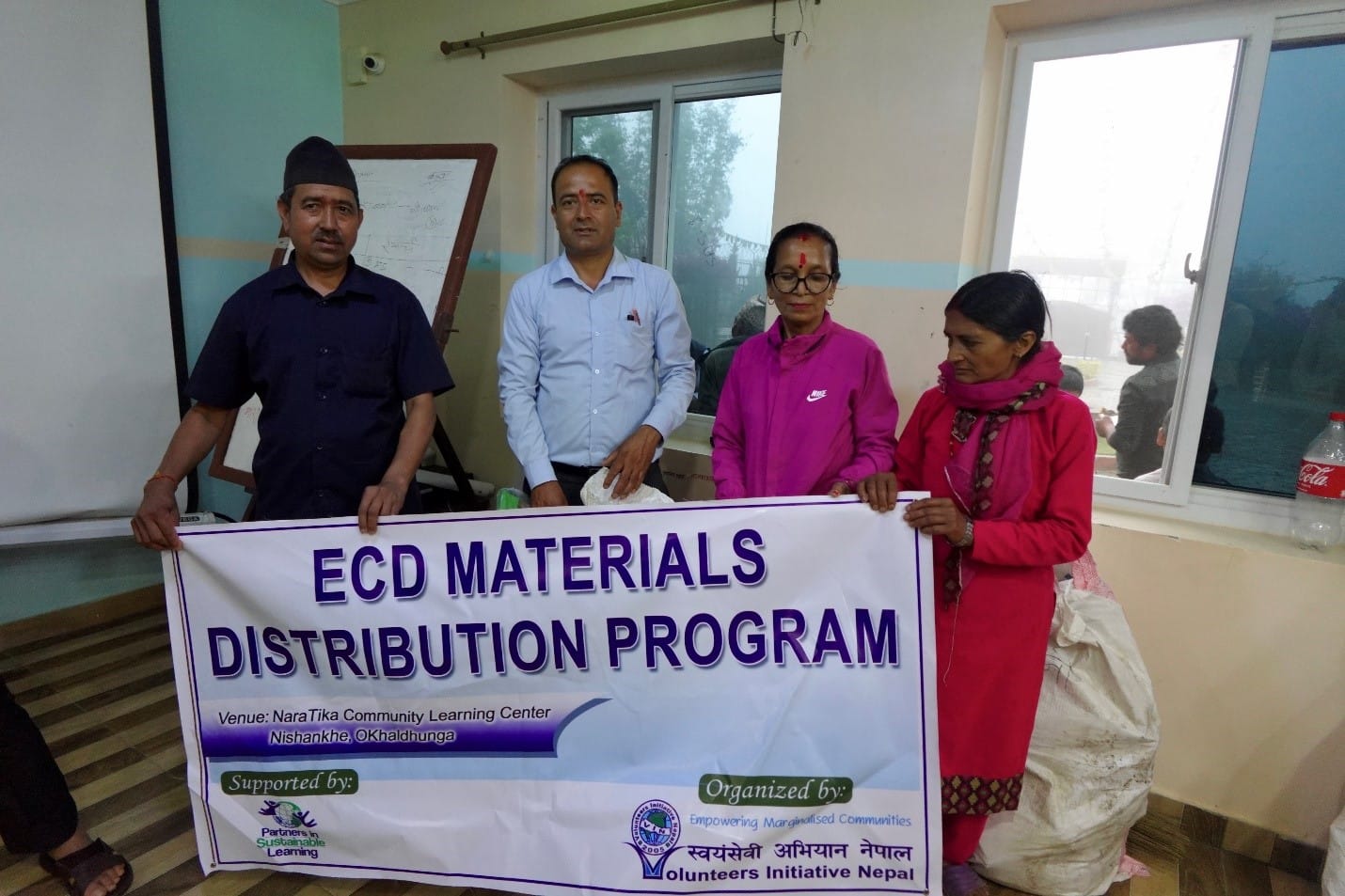NISHANKHE, OKHALDHUNGA — June 15, 2025 – Volunteers Initiative Nepal (ViN) distributed more than NPR 1 million worth of education resources and emergency rescue gear to local communities in Okhaldhunga and Khotang districts. The distribution event drew over 250 participants—including teachers, head teachers, parents, children, municipality representatives, social workers, and Disaster Risk Management (DRM) Volunteer Task Force members—from Nishankhe, Thulachhap, Chisankhugadi-6, and Dharapani areas. The initiative, made possible by generous support from the Taiwan Fund for Children and Families (TFCF) and the European Solidarity Corps (ESC), aimed to enhance the distribution of educational materials while strengthening local emergency response capacity.
Investing in Education Equity and Community Safety
ViN’s education resource initiative addressed critical gaps in remote learning environments. Rural schools and Early Childhood Development (ECD) centers often lack basic supplies, hindering student engagement and learning outcomes. ViN’s effort distributed multi-faceted support:
| Recipient | Material | Purpose |
| 24 Schools | Educational and sports materials | To enhance classroom engagement and physical education |
| 24 ECD centers | Age-appropriate learning kits | To better support early childhood education |
| 45 children from marginalized backgrounds | Uniforms, learning kits, clothes | To ensure dignity, participation, and equality |
| DRM task forces in 3 communities | Rescue equipment | To strengthen local disaster resilience |
| Public spaces | 200-liter sanitation bins | To improve hygiene and waste management |
“Providing children with access to quality learning materials like books, stationery, and sports gear empowers them academically and socially,” explained Bhupendra Ghimire, Founder and President of ViN. “This project reflects our commitment to educational equity through resource access.”
Why This Matters: Educational Material Distribution in Action
Even with dedicated teachers, a lack of supplies limits opportunities in Nepal’s rural education system. ViN’s school supply distribution programs provide necessary tools for meaningful learning interactions. With better educational materials, students can engage more creatively, and teachers can design multi-sensory lessons, which are fundamental to literacy and early development.
“This is more than a box of supplies,” said Deputy Mayor Kedar Babu Basnet of Siddhicharan Municipality. “It’s about ensuring every child has the tools they need to learn and grow.”
ViN’s approach also addresses “how to distribute educational materials” effectively. Collaboration with municipal leaders, school staff, ECD coordinators, and parent groups ensured that items reached the correct recipients, maximizing impact. Volunteers also participated in training on organizing materials and monitoring usage, further reinforcing the program’s sustainability.
Building Resilient Communities with Emergency Rescue Gear
Nepal is highly susceptible to natural disasters, including earthquakes, landslides, and floods. ViN’s distribution of emergency rescue gear—stretchers, helmets, gloves, safety boots, and ropes—to DRM Volunteer Task Force units was a critical component of the program. These trained community volunteers are now better equipped to respond quickly and efficiently to emergencies.
“Now we have the right safety gear for the emergency relief task force so that we can respond effectively during disasters,” said Rita Thapa, a local social worker. “This enhances community resilience and saves lives.”
ViN’s integrated model combines the distribution of educational materials with disaster preparedness. This dual-purpose program not only supports children in schools but also directly benefits whole communities—an effective strategy in resource-limited settings.
How Sustainability Meets Practicality in Rural Education
One notable aspect of ViN’s program is its sustainability model. Donors provided materials, but local stakeholders took ownership. Community volunteers assisted with sorting and packaging; school committees helped organize logistics. This localized approach ensures items are actively used and maintained.
ViN’s model aligns with the best education resource platforms in developing countries, relying on local ownership and practical implementation. After the event, ViN will offer guidance on using these resources in classrooms, including:
- Incorporating sports materials into physical education classes
- Using age-appropriate ECD kits in early childhood curricula
- Integrating sanitation bins in health and hygiene lessons
ViN will also train teachers in utilizing resources for early childhood education and effective teaching of sports.
Voices from the Ground: Stakeholder Perspectives
“When children received their first real learning kit, their joy was immeasurable,” shared Teacher Kalpana Rai of Thulachhap. “These educational resources will enhance teaching quality and help students stay engaged.”
Nirmala Rai, a parent, said: “Uniforms and school kits brought pride to our children. We can now confidently send them to school, knowing they have the right materials.”
Bhupendra Ghimire reiterated the significance of combining education and emergency support: “By empowering students and equipping community responders, we ensure long-term resilience. This event was testimony to our belief that investments should address both academic growth and community safety.”
What’s Next: Scaling the Impact
Buoyed by the success in Okhaldhunga, ViN plans to replicate the model in other rural regions. The next phase will focus on:
- Expanding educational resource distribution to additional schools and ECD centers.
- Extending DRM training and rescue gear distribution to new volunteer task forces.
- Monitoring educational outcomes—assessing student performance, attendance, and teacher feedback.
- Strengthening evacuation and disaster response systems among community teams.
ViN also aims to engage more international volunteers and local donors, reinforcing its motto: “Education, Empowerment, Resilience.”
“We invite global partners to support us in bringing education resources for teaching sports and literacy, which creates long-term benefits,” said Ghimire. “Our program offers measurable change and accountability.”
Supporting Sustainable Development: Why It Matters
ViN’s work aligns with global efforts to improve education in underprivileged areas. By providing education materials for developing countries and enhancing disaster resilience, ViN contributes to multiple Sustainable Development Goals (SDGs), including:
International donors should recognize the potential of this model—it offers scalable, impactful results with community ownership, transparent reporting, and long-term sustainability.
Summary
On June 15, 2025, ViN delivered life-changing education resources and emergency rescue gear worth over NPR 1 million to rural Nepal. Over 250 community members supported the initiative, recognizing its importance in providing access to quality learning materials and enhancing disaster readiness.
With continued support, ViN will replicate this model across Nepal, ensuring equitable resource distribution, community resilience, and educational promise for future generations.
What You Can Do:
- Donate via PayPal at donate-now page
- Partner with ViN for future projects
- Volunteer with ViN in education or disaster response
Together, we can uphold the belief that every child deserves a quality education—and every community deserves the tools to thrive safely.
About ViN
Volunteers Initiative Nepal (ViN) is a nonprofit organization dedicated to empowering communities through education, health, youth development, women’s empowerment, and disaster preparedness. Since 2005, ViN has mobilized over 5,000 volunteers to strengthen remote communities across Nepal.
Contact Us:
- Website: volunteersinitiativenepal.org
- Email: info@vin.org.np
Gallery





 Member of
Member of